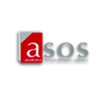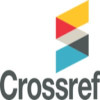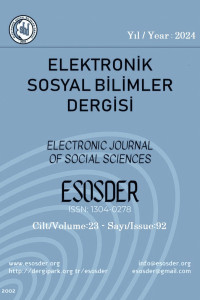Research Article
Review
Aim & Scope
Electronic Journal of Social Sciences (e-ISSN: 1304-0278) aims to contribute to science by publishing scientific studies in the field of Social Sciences.
Academic studies written in Turkish and English are accepted for our independent, double blind peer-reviewed, open access and online journal. The manuscripts submitted to the journal should not have been previously published or in the evaluation process in another medium. The manuscripts that are deemed appropriate to the writing rules and the scope of the journal are sent to two referees who are experts in their fields for scientific evaluation. The Editorial Board follows the Committee on Publication Ethics (COPE) criteria and carries out the evaluation process by taking into account the comments of the referees.
Electronic Journal of Social Sciences covers fields such as Educational Sciences, Economics, Business Administration, Law, Fine Arts, Sociology, History, Political Science, Communication Sciences.
Article Submissions
Original, unpublished manuscripts that are not in the evaluation process in another journal and whose content and submission have been approved by each author are accepted for evaluation.
Readership
The target readership is the members of the social sciences and humanities professions, experts, researchers, specialisation and doctoral students as well as students related to this field. It aims to contribute to the spread of continuous professional development and research culture.
Publication Period
Our journal is published four issues a year in January, April, July and October.
Copyright
The copyrights of the works published in our journal belong to their authors. Authors give permission for their intellectual work to be published by our journal under the Creative Commons Attribution-NonCommercial 4.0 International (CC BY-NC 4.0) licence.
Author Guidelines
Articles sent to the journal with a request for publication are sent to two referees (double blind refereeing) by the editor. In case of need, it can also be sent to the 3rd or 4th referee. The relevant field editor reviews the submitted article. Manuscripts that do not comply with the spelling rules can be sent back to the author for correction. The publication process of the submitted articles varies according to the intensity of the field. However, the article should not be expected to be published in the first issue after the first submission date. The publication acceptance process can take an average of 3 months.
In the journal, similarity scanning is carried out using Intihal.net software. This rate is expected to be maximum 20% in the controls made during the pre-control phase.
1-The manuscripts submitted to the journal must not have been previously published or submitted to another journal for publication.
2-The manuscripts submitted for publication must be prepared in Turkish or English in accordance with the rules of academic writing.
3-Publication rights of all published works belong to the authors.
4-After the manuscripts submitted to the journal are examined by the relevant referees and given a ‘publishable’ report and approved by the editor, they are queued for publication.
5- Manuscripts that do not require correction by the referee or editor do not have to be sent back to the author, even for control purposes. However, the author himself/herself may request correction.
6-It is not recommended to add, sort, delete or rearrange author names in articles with more than one author. Such a request can only be made with the consent of the journal editor before the article is accepted for publication and after obtaining the approval of all authors. The responsibility belongs to the author who uploaded the article.
7-The relevant editor may make spelling corrections that he/she deems necessary. Again, the foreign language editor may correct the Abstract if deemed necessary.
8-Scientific studies and their attachments (photographs, figures, tables, etc.) should be written in Times New Roman 12 pt. 1 line spacing in Word programme (Abstract and Abstract 10 pt. 1 line spacing, first line of paragraph 0). Margin settings: top 2.5cm, left 2.5cm, right 2.5cm, bottom 2.5 cm, the first line of the paragraph should be 1.25 cm inside, the spacing between paragraphs: 0 pt. before, 6 pt. after. Main headings should be 12 pt. before and 6 pt. after, subheadings should be 6 pt. before and 6 pt. after. Subject headings should be numbered. There should be no blank lines between paragraphs.
9-Abstract and Keywords (Turkish) and Abstract and Keywords (English) consisting of maximum 200 words should be placed at the beginning of the study. At the end of the article; Statement of Contribution of the Researchers, Statement of Support and Acknowledgement, if any, and Statement of Conflict can be given.
10-Footnotes in the articles should be prepared in APA (American Psychological Association) or classical footnote format and given in the text. Complete bibliographic information should be provided for all references cited. It is recommended to use the Latin alphabet for all cited references (this is important for the impact factor of the citation).
11- Abstract, Abstract, Keywords, Keywords and References should be added to the metadata of the article. *
12- The opinions expressed in the articles published in the journal are binding on the authors. All legal responsibility of the articles belongs to the authors.
13- The articles published in the journal can be quoted with the condition of citing the source. It is recommended to cite the journal in the form of author, article name, Electronic Journal of Social Sciences (www.esosder.org), volume, number, year.
14-Copyrights are not paid for the published articles.
15- It is recommended that the scientific studies to be submitted should not exceed 20 pages.
16-Author information should not be given in the full text of the article. This information should be given on the Title Page (Article tag). If a completed thesis study is utilised in the study, information on this subject should also be given in the article colophon, but not in the full text.
17- The study to be submitted must be uploaded with the following files:
• Full text article without author name (file name, author names should not be like ‘ahmet-yilmaz.doc’, it can be like ‘esosder-tammetin.doc’ or ‘article-tammetin.doc’) *
• Article colophon (Article title, for each author; author name, title, institutional information, e-mail address, Orcid number, and information about permission for articles requiring ethics committee permission) * https://dergipark.org.tr/tr/journal/320/file-manager/31896/download
• Copyright agreement *
• Ethics committee report (https://dergipark.org.tr/en/pub/esosder/policy)
18- In scientific studies to be submitted to the journal, maximum attention should be paid to compliance with research and publication ethics.
19- For all kinds of communication, info@esosder.org address can be used. https://dergipark.org.tr/en/pub/esosder/policy
20- For article contribution and other issues, see About the Journal and Frequently Asked Questions.
21-Please check whether the following points have been made before submitting your article.
• Is the article prepared according to the journal writing rules?
• Is the Abstract/Abstract less than 200 words? Are at least 3 and at most 5 Keywords/Keywords given?
• Is the metadata (Abstract, Abstract, Keywords, Abstract, Keywords and References) of the article organised?
• Is the author of the full-text article anonymous?
• The full-text article name should be like ‘tammetin-esosder.doc’, there should be no author name or article name in the file name.
• When you right-click on the article file you will upload on your computer and select properties/details/authors from the window that opens, a space should be given in the author name. There should be no author name in this field.
• Is the imprint (title page) according to the template given? (Author title, institution, e-mail and Orcid information must be given)
• Is the copyright agreement signed and uploaded?
• Is the number of pages limited to 20-22?
• Is there a title such as method, findings, etc. (especially mandatory for research articles)?
• Is the Ethics Committee Permission document uploaded?
• Has the article contribution been paid?
Note After requesting DOI for the article; The decision cannot be changed. The article cannot be returned. The article cannot be rejected. The article cannot be withdrawn by the author.
*ARTICLES THAT DO NOT COMPLY WITH THESE RULES WILL NOT BE EVALUATED.
Duties and Responsibilities of Authors
Authorship and Contribution
Authorship should be limited to those who made significant contributions to the conception, design, conduct, or interpretation of the study. All significant contributors should be listed as co-authors. If there are minor contributors, e.g. language editing, they should be acknowledged in the acknowledgements section. The corresponding author should ensure that all co-authors have seen and approved the final version of the manuscript and agree to its submission for publication. Authors are expected to carefully review the list and order of authors before submitting their manuscript and to provide the final author list at the time of original submission. Only in exceptional circumstances will the editor consider the addition, deletion, or reorganisation of authors after the manuscript has been submitted. All authors must agree to any such addition, deletion or reorganisation. The authors take joint responsibility for the work.
Article Writing
Authors of original research papers should address the topic in an original way and with an objective discussion. The paper should include sufficient detail and references to allow others to replicate the work. Fraudulent or knowingly false statements constitute unethical behaviour and are unacceptable.
Originality
The author must ensure that the manuscript is original, has not been previously published elsewhere, and is not under consideration for publication elsewhere, in another language.
Using Original Sources and Citation
Authors must ensure that they have written entirely original work and, if they have used the work or words of others, that this is properly cited. Privately obtained information, such as in conversations, correspondence or discussions with third parties, should not be used without the express written permission of the source.
Data Access and Preservation
Authors may be asked to provide research data supporting their articles for editorial review and/or to comply with the journal's open data requirements. Authors should be prepared to provide public access to such data, if possible, and to retain such data for a reasonable period after publication.
Multiple and Simultaneous Publication
An author should not publish an article containing the same research in more than one journal. It is unethical to submit the same article to more than one journal at the same time. An author should not submit a previously published article for consideration in another journal, except in the form of an abstract.
Publication of Studies Based on Questionnaires and Interviews
For research in all disciplines that require ethics committee approval (ethics committee approval must be obtained, this approval must be stated and documented in the article. In researches requiring ethics committee approval, information about the approval (name of the committee, date and number) should be included in the method section, as well as on one of the first/last pages of the article; in case reports, information on the signature of the informed consent form should be included in the article.
Conflict of Interest
Any financial or other interest that may cause the person to be conflicted in his/her work, significantly impair his/her objectivity, or provide an unfair advantage in favour of any person or organisation. All sources of financial support received during the conduct of the research and preparation of the manuscript and the role of sponsors in the study should be disclosed. If there is no source of funding, this should also be indicated. Examples of potential conflicts of interest that should be disclosed include consultancies, salaries, grants. Potential conflicts of interest should be disclosed at the earliest possible stage.
Error Reporting
When an author notices a significant error or inaccuracy in his/her published work, he/she should notify the journal immediately. It is also the author's obligation to co-operate in withdrawing or correcting the manuscript if deemed necessary by the editor. If the editor or publisher learns from a third party that a published work contains errors, it is the author's obligation to co-operate with the editor, including informing the editor.
Image Integrity
It is unacceptable to enhance, darken, move, remove or add a specific feature in an image. Authors must adhere to the policy for graphic images implemented by the journal.
Ethical Principles and Publication Policy
Publication Ethics Principles
Publication Ethics can be defined as a self-regulatory mechanism that insists on integrity on behalf of authors, reviewers and publishers to establish higher standards of editorial processing. Ethical standards for publication exist to ensure high-quality scientific publications, public confidence in scientific findings, and respect for people's opinions.
• Honest researchers do not plagiarise.
• They do not misattribute sources.
• They do not hide objections they cannot refute.
• They do not distort opposing views.
• They do not destroy or conceal data.
Peer-reviewed studies are studies that support and realise the scientific method. At this point, it is of great importance that all parties involved in the publication process (authors, readers and researchers, publisher, referees and editors) comply with ethical principles. Our journal adheres to national and international standards in research and publication ethics. It complies with the Press Law, the Law on Intellectual and Artistic Works and the Directive on Scientific Research and Publication Ethics of Higher Education Institutions. Our journal has adopted the International Ethical Publishing Principles published by the Committee on Publication Ethics (COPE), Directory of Open Access Journals (DOAJ) and Open Access Scholarly Publishers Association (OASPA). It also undertakes to comply with the decisions of the Turkish Editors' Workshop.
• Press Law (National Legislation)
• Law on Intellectual and Artistic Works (National Legislation)
• Higher Education Institutions Scientific Research and Publication Ethics Directive (National Legislation)
• Transparency and Best Practice Principles in Academic Publishing (International Criteria)
• Turkey Editors' Workshop Decisions (National Criteria)
PUBLICATION ETHICS
Author(s);
Persons who have not made any contribution to the work during the scientific research and writing phase should not be listed as authors.
The same publication should not be submitted to more than one journal. Author(s) are advised (by TR Index) not to include the supervisor as the first author in studies produced from graduate theses. Author(s) are advised (by TR Index) to provide a Declaration of Contribution Ratio of the Researchers, a Statement of Support and Acknowledgement, if any, and a Conflict Statement at the end of the article. Author(s) should avoid unethical behaviours such as irresponsible authorship, piracy, fabrication, multiple publication, divisional publication, biased source, biased publication, violation of human-animal ethics. The author(s) should act in accordance with the citation system specified in the journal during the writing phase of the candidate article. Unpublished or unpresented works should not be cited as references. All or part of any work cannot be published without permission or reference (plagiarism). The author(s) should indicate the financial sources of the study, if any. The status of the article regarding ethical issues and ethics committee permissions should be clearly stated in the methods section of the relevant article.
Editor(s);
The editor(s) should pay attention to the absence of the names of the author(s) in the full-text article to be sent to the referees, and should not inform the referees of the names of the authors. The candidate is obliged to appoint at least two referees suitable for the subject of the article. The candidate should ensure communication between the referee(s) and the corresponding author, taking into account the double-blind refereeing process. They should maintain their relations in a transparent and objective manner without discriminating between any author and referee. They should not use their position for their own personal and academic interests. Provide clear and detailed justifications for candidate manuscripts that they will reject.
They should also consider scientific research, publication and referee ethics.
Reviewer(s);
Referees must be experts in the fields addressed by the candidate article.
They should make their criticisms objectively and clearly. Referees should not request to learn the names of the author(s) of the study they will evaluate, and considering that the study texts are personal, they should not be shared with third parties. They should not transfer information for their own work from the candidate article in the evaluation process and should not pursue any academic/personal interest.
For the candidate articles that they will reject, they should clearly and in detail state the reasons for rejection.
They should also consider the rules of scientific research and publication ethics. Referees must indicate their titles and names in the evaluation report.
ETHICAL PRINCIPLES
Scientific Research Ethics:
The following points should be taken into consideration for the ethics committee report:
Separate ethics committee approval must be obtained for research in social sciences and for clinical and experimental human and animal studies that require ethics committee approval, and this approval must be stated and documented in the article. Articles should include a statement that Research and Publication Ethics are complied with. In studies requiring Ethics Committee approval, information about the approval (name of the committee, date and number) should be included in the method section and also on the first/last page of the article. In case presentations, information on the signature of the informed consent/assent form should be included in the article.
Researches that require Ethics Committee approval are as follows:
All kinds of research conducted with qualitative or quantitative approaches that require data collection from participants using survey, interview, focus group study, observation, experiment, interview techniques. The use of humans and animals (including materials/data) for experimental or other scientific purposes, Clinical research on humans, Research on animals, Retrospective studies in accordance with the law on the protection of personal data. In addition; obtaining and indicating permission from the owners for the use of scales, questionnaires, photographs belonging to others, indicating that copyright regulations are complied with for the intellectual and artistic works used. Researchers who are not members of the university can apply to the Ethics Committees in their regions for the Ethics Committee Report.
Price Policy
The contribution fee must be paid for the submitted work (regardless of the acceptance/rejection condition of the work). After the contribution is paid, info@esosder.org should be informed. The referee process is not started for the articles for which the contribution fee is not paid. For rejected/withdrawn articles, 50% of the deposited contribution is refunded. You can access the account number and other information to which the article contribution will be deposited from the Submission Preparation List.
Indexes
Citation Indexes
Other Indexes
Journal Boards
Publisher and Editor-in-Chief

Editors

Field Editors









Foreign Language Editor
Editorial and Advisory Board



















